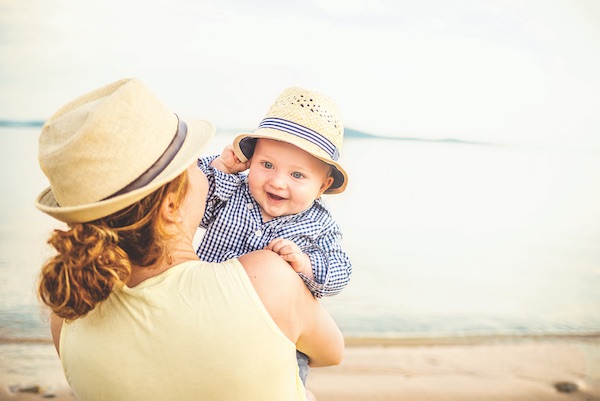Outside your comfort zone

Nature doesn’t exactly come babyproofed. For new parents, this fear of the uncontrolled and unknown can be scary, especially when you’ve just been entrusted with a new little life to take care of and keep safe. But according to experts, although you can’t entirely avoid all risks, getting outdoor exposure is important for your child’s health and development.
Condie Ward, a preschool educator in Connecticut who specializes in outdoor curriculum, says that by preschool it’s quite obvious which kids have not had enough exposure to the outside world. She says that too many preschool-aged children are scared of setting foot beyond the doorstep, a behavior that’s learned from their parents.
Even before a child can crawl or walk, it’s important to spend time outside, says Ward. This early exposure, as simple as it may seem, makes a big difference. Infants should be outdoors every day, if possible, for as much time as a parent can manage.
“When young children spend time outside it helps them to develop their senses and become observant,” says Ward. “Unstructured time in nature allows kids to develop creativity and problem solving skills.” For younger babes, this is as easy as taking a long walk with a stroller or baby carrier.
Ward also notes that it’s an instant stress reducer. With infinite things to touch, smell and see, nature tends to distract babies from whatever made them uncomfortable in the first place. “Have you ever taken a fussy baby outdoors?” she asks. “You’ll notice that it almost immediately improves a baby’s mood.”
Once small children learn to walk and begin to establish a sense of self, explains Ward, the outdoors helps them build confidence. When your child balances on a log or climbs a tree, he can feel good about the accomplishment. Kids can make their own choices and have their own successes. Confidence comes from being able to do things without constant help from mom and dad.
Made in the shade
Though spending time in nature is important for a child’s development, too many parents are fearful of what they can’t control. But balancing your little one’s safety with a healthy dose of Mother Nature is easier than you might think.
According to Carol Wagner, MD, professor of pediatrics at the Medical University of South Carolina, you can protect your wee one with a few simple steps. Small babies in particular need constant protection from harsh sunlight—but are too young for sunscreen, which should be avoided until baby’s half birthday. For that reason, the American Academy of Pediatrics (AAP) recommends that all infants younger than 6 months old stay out of the direct sun during the summer to avoid sunburn. Newborns should be completely covered and in the shade as much as possible when the sun is at its hottest, between 11 a.m. and 4 p.m.
“Once an infant is over 6 months old, direct sunlight exposure is OK as long as the child has sunscreen of more than SPF 15 applied frequently,” advises Wagner. She adds that sunscreen should be applied prior to going outside and reapplied every few hours, especially after contact with water. Whether it’s cold or hot, top off your little one’s outfit with a hat to keep the sun off his face.
Even when your kiddo is out of direct sunlight, make sure that he stays hydrated and doesn’t get overheated during hot summer months. A baby receives all the hydration he needs from breast milk and/or formula until starting solids. In fact, giving newborns water can actually be harmful, causing a condition called oral water intoxication, where
the electrolytes in the bloodstream become too diluted. Once your babe starts solids,
you can bring a sippy cup with water when you head outdoors. If he becomes too hot, his skin may appear flushed, red or sweaty. That’s a sure sign it’s time to cool off inside for a while.
Bug off
If you live in an area with a high concentration of mosquitoes, protecting your little one from bug bites can also be a major concern. Some countries have mosquitoes that carry diseases including the chikungunya, dengue and Zika viruses. Thus far, the continental U.S. has been lucky enough to escape most of these infections although some cases of locally acquired Zika virus have been documented in the Miami area and parts of Texas, near the Mexico border.
But even without the risk of illness, pesky bug bites are no fun, especially when they swell into welts on an infant’s sensitive skin. To get the best protection, use an insect repellent with 10 percent DEET, which is safe for pregnant and nursing women and children older than 2 months. Picarin is another option commonly used in Europe—but less well known in the U.S. Although the Centers for Disease Control and Prevention has said that picarin is a safe and effective alternative to DEET, the AAP has yet to give it the all clear for babies because of a lack of long-term research.
It might seem like a good idea, but sunscreens that contain bug repellent are a no-go for babies because you need to apply sunscreen more often than insect repellent, which can cause your tot to be overexposed to chemicals.
The natural world isn’t predictable, which can sometimes make it a scary endeavor for new parents, but it also provides a world of boundless learning and developmental possibilities that you just can’t recreate indoors. Whether you’re strolling through the park or going on a weekend camping trip, children thrive in their natural surroundings and the more they get outside, the better.







